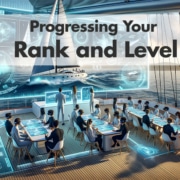How to qualify to skipper a boat on a sailing vacation
Focus on Knowledge and Experience – The Certification Will Follow
Navigating The Journey to Bareboat Yacht Chartering Competence: Your sailing journey is an exciting and rewarding adventure. Whether you’re dreaming of chartering a yacht in the Caribbean, Mediterranean, or Pacific, or simply enjoying a day out on your local waters, the key to becoming a competent and confident sailor lies in gaining both theoretical knowledge and practical skills and experience. At NauticEd, we emphasize that the journey to competence is far more important than simply obtaining a certification.
The Importance of Theory and Experience
Many new sailors make the mistake of focusing solely on obtaining a certification, thinking it is the ultimate goal. However, a properly issued certification is awarded based on competence, not just passing a test or an assessment. Knowledge and experience are critical, and they cannot be substituted by merely holding a certificate. Just as in firefighting or flying an airplane, an appropriate amount of practical experience is vital. While it might seem difficult to gain experience if one does not own a sailboat, there are other innovative ways. Read this article: https://sailing-blog.nauticed.org/nineteen-ways-to-get-sailing-experience-if-you-dont-own-a-boat/
Unfortunately, some associations train new sailors to focus on certification. This approach can create a false sense of confidence, which is dangerous and irresponsible. See this article – https://sailing-blog.nauticed.org/what-is-the-biggest-lie-in-sailing/. NauticEd believes that it realistically takes about 50 days of experience to master competence for bareboat chartering. Out of these, at least 25 days should be as the master of the vessel – meaning you were responsible for the vessel and the crew and making decisions regarding the safe passage of the voyage and the safety of everyone aboard. Only then does NauticEd award the Bareboat Charter Master certification. This experience should be on a similar type and size of vessel to what you intend to sail.
For some easier locations like the British Virgin Islands (BVI), less experience might be sufficient for some individuals. However, at lower levels of experience, it is essential to have a professional instructor or assessor provide an objective opinion on your competence. The United States Coast Guard has created the American National Standards for sailing training and assessment. It provides competence assessment rubrics (micro tasks) for assessors to use to observe the competence of the student. NauticEd is recognized by the US Coast Guard as the only official sailing education body in the USA adhering to these standards.
A Suggested 12-Step Journey to Skippering a Sailboat on a Sailing Vacation
- Begin with Theory Courses: Start with some theory courses to gain background sailing knowledge. NauticEd’s Introduction to Sailing course is a great starting point, offering a comprehensive 3-4 hour online learning experience. Basically, it is getting your feet wet with knowledge. The course is just $27.50!
- Take a Professionally Skippered Sailing Vacation: As soon as possible, take a professionally skippered sailing vacation in an easy destination like the BVI. Bring your family to ensure everyone enjoys the experience. Focus on having a great time and learning some basics without overwhelming yourself. If you are balking at hiring a skipper, read this blog article – https://sailing-blog.nauticed.org/why-hire-a-skipper-for-your-sailing-vacation/
- Begin the Bareboat Theory Knowledge courses: NauticEd provides a comprehensive bundle of courses called the Bareboat Charter Master bundle of courses. The courses will take about 40-50 hours of self-paced at-home study and testing. Before you skipper a boat on a vacation you should be completely familiar with all the material presented in these courses.
- Gain Sailing Experience Locally: Sail with a friend or join a yacht club to gain experience. Learning on the job is invaluable. We believe that gaining experience at home is crucial to your experience journey because of the quantity of experience required – that you should not be thinking that you can gain a certification while on a sailing vacation – read this blog as to why that is not necessarily practical – https://sailing-blog.nauticed.org/getting-a-sailing-qualification-while-on-a-sailing-vacation/
- Utilize Virtual Reality Training: Invest in a virtual reality headset and go through the NauticEd Virtual Reality training. NauticEd’s partnership with MarineVerse provides an excellent real-physics environment training program. VR training not only gives you excellent training but also builds muscle memory, which will save you from making costly mistakes in real-life situations. In addition, the VR training will teach you how to maneuver in a marina with only VIRTUAL dings to your boat not REAL and costly ones. Learn how to get in and out of tight spots with unfavorable winds. Learn Mediterranean Mooring techniques. Take away the nervousness of real docking when you have done it 100 times virtually. Pilots do VR training and retraining all the time. It only makes sense that sailors do as well.
- Get Professional Instruction: Take a day or two of professional sailing instruction to refine your skills and find weaknesses.
- Gain More Experience: Continue to sail locally, preferably some or all on a larger boat such as a 40 ft monohull. Try to position yourself as the skipper with an experienced friend available to step in if necessary.
- Undergo an Assessment: Once you have about 25 days of experience and have completed the NauticEd Bareboat Charter Master courses, undergo a bareboat charter readiness assessment with a sailing instructor to identify and address any weaknesses.
- Plan Your Own Skippered Trip or on a flotilla: Plan a trip to the BVI with you as the skipper, but consider taking an experienced friend or hiring a local professional to keep you out of trouble if you are not feeling 100% confident and competent. NauticEd offers many flotilla sailing opportunities whereby you can join as a skipper with your friends and family as crew. A flotilla is a slightly safer environment due to daily briefings and guidance.
- Continue Gaining Experience: Continue to gain experience at home, aiming to sail on larger boats if possible. Go on friends’ boats and ask to be the skipper of record with your friend only stepping in if the situation becomes dangerous.
- Prepare for International Certification: With your growing experience, you might be ready for an international sailing license like the SLC or ICC. Focus on areas of weakness identified by your instructor and get specific training on maneuvers like Mediterranean Mooring. Download the assessment documents in your NauticEd Curriculum and review the requirements – practice the requirements – ensure you understand all the theory knowledge such as navigation, giveaway rules, reading weather charts, maneuvering in a marina, tides, and more as supplied in the Bareboat Charter Master bundle of courses online.
- Book a Mediterranean Charter: Book a charter in a simple Mediterranean location such as the Ionian Islands in Greece. Practice and re-practice marina maneuvering in VR before your trip to maintain your muscle memory. In the Mediterranean, there are high-speed ferries, large tanker traffic, potentially instantaneous strong wind conditions, and very tight marinas requiring you to Mediterranean Moor. The prudent sailor might hire a skipper the first time in the Med. Port authorities in the Mediterranean REQUIRE you to have a sailing license. The USCG 6 PAX license is NOT enough and NOT accepted. In addition, yacht charter companies require you to have an adequate resume of experience – thus the 50 days NauticEd required for the SLC license. With the SLC you have a recognised license with an inherently accepted resume.
Throughout the above process, NauticEd’s yacht charter agency can navigate all the certification and licensing requirements for you while also finding you the appropriate yachts in the destinations you desire. NauticEd staff have visited virtually every yacht charter destination (sans a few) and can speak intelligently about each location. The NauticEd Yacht Charter Agency does not charge our students a fee for this service.
Summary
Remember, the primary focus should not be on obtaining a certification but on gaining knowledge, skills, experience, and associated competence. Identify and fix your weaknesses with the help of an instructor or a competent friend, and continually refresh your theory knowledge with NauticEd’s online multimedia courses.
You can not gain a qualifying resume to legitimately charter a sailboat with limited sailing experience or a “zero to hero” training program. Even if some association or organization gives you a bareboat certificate, your resume will simply not suffice for the yacht charter company, the yacht charter company’s insurance company, or the port authority.
NauticEd provides the best and most logical plan for growing competence in sailing, starting with the Introduction to Sailing course and progressing through the Bareboat Charter Master bundle of courses including a catamaran course and training leading to a Catamaran resume qualification.
NauticEd certifications are awarded throughout the journey based on the PURE COMPETENCE of the student.
By following this journey, you’ll be well on your way to becoming a confident and competent sailor. Happy sailing!










